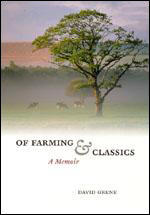Review: Grene, Of Farming and Classics

Last week, the Times Literary Supplement ran a review of David Grene’s posthumous memoir, Of Farming and Classics. Weaving together Grene’s life as a professor of classics at the University of Chicago with his alter ego as a farmer in Ireland and in Illinois, Of Farming and Classics delivers a refreshing and intelligent take on classical scholarship in the twentieth century. TLS reviewer Edith Hall seems to agree when she writes:
David Grene’s experience of Irish, British, Austrian and American Classics across the whole period from the 1920s until 2002 makes this slim, deftly written, posthumously published volume an illuminating read for every classical scholar engaged with the current quest for the subject’s roots, and the excavation of the way that it has evolved over the past century and a half. But Grene’s memoir is made really memorable by his “other”, bucolic voice; for his account of twentieth-century Classics runs in tandem with his memories of his other profession, as a dairy farmer in Illinois and subsequently in Wicklow and Cavan in Ireland.…
Belonging to two social worlds gives him an unusually keen eye for the precise nuances of social class and the ways in which they are defined and displayed. [For example,] looking at the effects of the British Empire on both farming and Classics produces a sophisticated reading of some aspects of both professions.… He [also] sees parallels between the mental attitudes and skills required of a satisfactory and personally satisfied small farmer and a university teacher: “some degree of intellectual discrimination and willingness to disregard the attraction of being like most other people”. He draws a few inspiring connections: for example, his charming account of how the myth of the centaur emerged from the magical synergy between a sensitive horse and a skilled rider. When talking of his own ecstasy in ploughing an Irish furrow with a team of horses, he alludes to passages in Hesiod and Aeschylus before drawing attention to what he perceives as the contentment of the ploughman in Breughel’s famous painting of the fall of Icarus.
We previously posted three excerpts from Grene’s book to this blog including “Dublin Theatre in the 1920s and ’30s”, “Learning Greek and Latin in Dublin Schools” and “Honors Classics at Trinity College.”